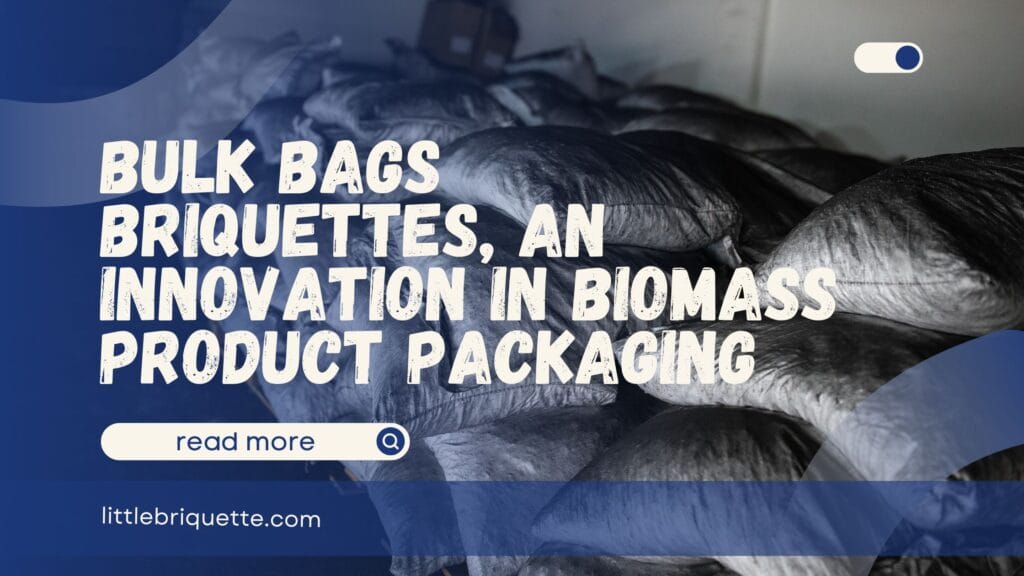In the renewable industry, briquettes as a source of biomass fuel are increasingly popular as an eco-friendly alternative. However, packaging and distributing briquettes in bulk often present challenges, particularly in maintaining quality and logistical efficiency. This is where bulk bags briquettes emerge as an innovative solution that not only facilitates storage and transportation but also offers several benefits, such as cost reduction and protection against product damage.
This article will explore in depth how the use of bulk bags can optimize briquette packaging, as well as the advantages and positive impacts it has on the biomass industry and renewable energy sector as a whole.
What are Bulk Bags Briquettes?
Bulk bags briquettes refer to the use of large, flexible containers (also known as FIBCs – Flexible Intermediate Bulk Containers) to package and distribute briquettes, which are solid biomass products used as an alternative fuel. Briquettes themselves are made from organic materials such as sawdust, agricultural waste, or bran that are compressed into solid block forms. These are commonly used in biomass power plants or as household fuel. Packaging briquettes in bulk bags allows for the transportation and storage of large quantities in a more efficient and cost-effective manner, as briquettes are typically produced in very high volumes and require practical packaging solutions.
Bulk bags offer several advantages when it comes to briquette packaging. Made from materials such as polypropylene, bulk bags are designed to withstand heavy loads and protect the product from environmental factors like moisture and sunlight, which can degrade the quality of briquettes. The adjustable size and capacity also allow producers to optimize large shipments at lower costs.
Additionally, bulk bags are more environmentally friendly compared to other packaging materials because they can be recycled and reused. With these various benefits, bulk bags have become the preferred choice in the renewable energy industry to improve supply chain efficiency and ensure that the quality of briquettes is maintained until they reach the end consumer.
Read Also: Natural Charcoal Briquette vs Chemical Briquettes
Why Briquette Packaging Needs Innovation
Briquette packaging faces several key challenges, particularly in the storage and transportation of large quantities. Briquettes, being dense and heavy, require strong and efficient packaging to minimize the risk of damage during transit. Additionally, these biomass products are highly susceptible to moisture and other environmental factors, which can affect the quality and effectiveness of the fuel.
Packaging innovation has become crucial as demand for renewable energy, especially from biomass, continues to rise. With the need to reduce distribution costs and improve logistical efficiency, more practical and eco-friendly packaging solutions, such as bulk bags for briquettes, can help address these issues. Better packaging solutions not only enhance the competitiveness of the industry but also support long-term sustainability.
Advantages of Using Bulk Bags for Briquettes Packaging
The use of bulk bags for briquette packaging offers a range of benefits for both producers and consumers. From operational efficiency to environmental impact, bulk bags have become the preferred choice to enhance distribution effectiveness and product quality. Here are some key advantages of using bulk bags for briquette packaging:
Shipping and Storage Efficiency

Bulk bags allow for the storage of large quantities of briquettes in a more efficient manner. With adjustable capacity, a single bulk bag can hold a significant amount of briquettes, reducing the need for additional packaging and storage space. This also lowers packaging costs, as individual packaging for each briquette unit is unnecessary, optimizing overall logistics expenses.
On the shipping side, using bulk bags enables the transportation of briquettes in large volumes at a more cost-effective rate. The more efficient packaging reduces the number of containers or vehicles required for transportation, which, in turn, cuts down on distribution costs. With more efficient shipping, delivery times can be shortened, improving supply chain flow and reducing the environmental impact of transportation.
Product Safety and Protection

One of the key advantages of bulk bags is their ability to protect briquettes from moisture and physical damage during storage and transportation. Since briquettes are made from organic materials, they are highly susceptible to moisture fluctuations that can affect their combustibility. Bulk bags are designed with water-resistant materials and include layers that safeguard the contents from environmental factors, ensuring that the quality of the briquettes is maintained until they reach their destination.
In addition, bulk bags for briquettes are designed to withstand significant weight, ensuring that the product does not get damaged or compressed during shipping. With tear-resistant properties, bulk bags reduce the risk of product loss or damage. This level of security and protection is crucial for ensuring that the briquettes that reach consumers are in optimal condition and ready for use.
Bulk Bags for Briquettes Are More Environmentally Friendly

Bulk bags are made from recyclable materials, such as polypropylene, making them a more eco-friendly packaging choice compared to single-use packaging materials. Using bulk bags helps reduce plastic and cardboard waste, which are typically used in packaging smaller quantities of products. Due to their durability, bulk bags also reduce the frequency of needing new packaging, supporting the sustainability principles in packaging.
Moreover, the use of bulk bags reduces reliance on packaging materials that are more harmful to the environment, such as single-use plastic bags or other non-biodegradable materials. As more companies focus on environmental responsibility, bulk bags offer a practical and efficient solution that aligns with the modern industry’s demands to reduce carbon footprints and enhance sustainability in their operations.
The Future of Briquette Packaging and Other Innovations
The future of briquette packaging will be greatly influenced by advances in eco-friendly materials and more efficient packaging technologies. Recent innovations in materials, such as the use of biodegradable polymers or stronger yet lighter composite materials, can enhance both sustainability and packaging efficiency.
In addition, more advanced designs for bulk bags, featuring elements like ventilation to maintain briquette quality or protective layers that better guard against temperature and humidity fluctuations, will become the new standard in the industry. As the biomass sector grows and the demand for renewable energy increases, innovations in packaging will support more cost-effective, eco-friendly, and efficient briquette shipping, contributing to the overall development of the biomass industry.
Read Also: Effective Tips and Tricks for Using Briquettes for Gas Grill
Buying Coconut Charcoal Briquettes Becomes More Cost-Effective
By purchasing coconut charcoal briquettes in bulk, you can save on packaging and shipping costs. This is one of the best solutions to reduce high expenses.
Now, Little Briquette is here as the largest certified coconut charcoal briquette factory, capable of shipping large quantities internationally. You can make a purchase directly by contacting the admin number here and start contributing to environmental protection right from the source!

